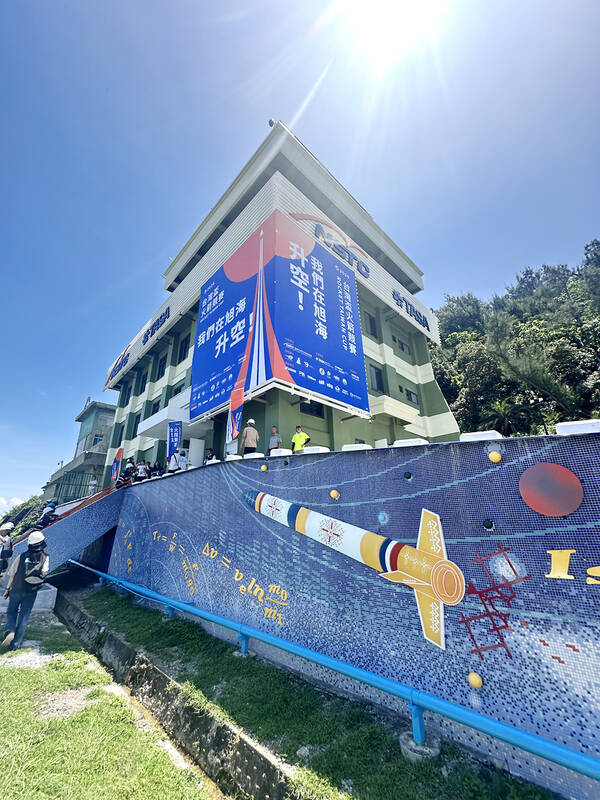Taiwan yesterday inaugurated the nation’s first research rocket launch control center in Hsu Hai Village (旭海) in Pingtung County’s Mudan Township (牡丹).
Speaking at the event, National Science and Technology Council (NSTC) Minister Wu Cheng-wen (吳誠文) said the center’s inauguration was an important step in the development of Taiwan’s space industry, to ensure the nation can compete in space.
The NSTC’s 10-year plan to develop the industry involves the completion of a national launch site and the comprehensive training of talent in research rocketry, he said.

Photo: Tsai Tsung-hsien, Taipei Times
Educational activities would also be developed to attract young people to the sector, which would include the establishment of space museums and educational centers in Taitung and Pingtung counties, he said.
“The Pingtung County Government will make Hsu Hai a new cradle for developing rocket technology and nurturing space talent,” Pingtung County Commissioner Chou Chun-mi (周春米) said. “The initiative is also expected to attract industrial investment, boosting the local economy and science education.”
Taiwan Space Agency Director-General Wu Jong-shinn (吳宗信) said that before the new rocket assembly facility was built, students and teams working at the Hsu Hai launch site had to operate under harsh conditions, often exposed to the sun and rain, which also risked damaging sensitive electronic components.
The facility features a ceiling height of 7m and 2m-thick blast-resistant walls, he said.
Commenting on other facilities at the site, he said the launch pad includes a lightning protection tower, a micro weather monitoring station and a water storage tank.
The renovated control center — leased from the Chungshan Institute of Science and Technology — includes a control room, viewing area and conference room, he said.

Taiwan has received more than US$70 million in royalties as of the end of last year from developing the F-16V jet as countries worldwide purchase or upgrade to this popular model, government and military officials said on Saturday. Taiwan funded the development of the F-16V jet and ended up the sole investor as other countries withdrew from the program. Now the F-16V is increasingly popular and countries must pay Taiwan a percentage in royalties when they purchase new F-16V aircraft or upgrade older F-16 models. The next five years are expected to be the peak for these royalties, with Taiwan potentially earning

STAY IN YOUR LANE: As the US and Israel attack Iran, the ministry has warned China not to overstep by including Taiwanese citizens in its evacuation orders The Ministry of Foreign Affairs (MOFA) yesterday rebuked a statement by China’s embassy in Israel that it would evacuate Taiwanese holders of Chinese travel documents from Israel amid the latter’s escalating conflict with Iran. Tensions have risen across the Middle East in the wake of US and Israeli airstrikes on Iran beginning Saturday. China subsequently issued an evacuation notice for its citizens. In a news release, the Chinese embassy in Israel said holders of “Taiwan compatriot permits (台胞證)” issued to Taiwanese nationals by Chinese authorities for travel to China — could register for evacuation to Egypt. In Taipei, the ministry yesterday said Taiwan

Taiwan is awaiting official notification from the US regarding the status of the Agreement on Reciprocal Trade (ART) after the US Supreme Court ruled US President Donald Trump's global tariffs unconstitutional. Speaking to reporters before a legislative hearing today, Premier Cho Jung-tai (卓榮泰) said that Taiwan's negotiation team remains focused on ensuring that the bilateral trade deal remains intact despite the legal challenge to Trump's tariff policy. "The US has pledged to notify its trade partners once the subsequent administrative and legal processes are finalized, and that certainly includes Taiwan," Cho said when asked about opposition parties’ doubts that the ART was

If China chose to invade Taiwan tomorrow, it would only have to sever three undersea fiber-optic cable clusters to cause a data blackout, Jason Hsu (許毓仁), a senior fellow at the Hudson Institute and former Chinese Nationalist Party (KMT) legislator, told a US security panel yesterday. In a Taiwan contingency, cable disruption would be one of the earliest preinvasion actions and the signal that escalation had begun, he said, adding that Taiwan’s current cable repair capabilities are insufficient. The US-China Economic and Security Review Commission (USCC) yesterday held a hearing on US-China Competition Under the Sea, with Hsu speaking on